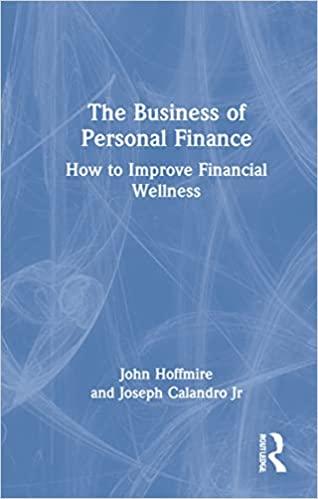Question
1. You just turned 24 years old today, have just received your masters degree from the University of Maryland, and have accepted your first job.
1. You just turned 24 years old today, have just received your masters degree from the University of Maryland, and have accepted your first job. You have decided to put $12,000 per year into your 401-K plan. Assume that you will make the payments on your birthdays, starting one year from now on your 25 birthday until your 69 birthday, totaling 45 payments in all. Every dollar that has not yet been withdrawn from the plan is expected to earn a 7% rate of return per year. Your first withdrawal will be on your 70th birthday (46 years from today) and you plan to annually withdraw funds from the account each year on your birthday.
a. How much will you have in your 401-K after you make your last deposit at age 69? (10) b. What constant amount will you be able to withdraw each year if you want the funds to last until your 100 birthday (31 payments)? (10)
c. Suppose that you instead want to make monthly withdrawals at the end of each month starting the month you turn 70 until the month before you would have turned 101. Hence, you will be making 372 withdrawals. If your savings are still earning a 7% annualized compound interest rate (note this is not a simple rate), how much can you withdraw each month? (15)
d. Suppose that you want to make monthly withdrawals of $25,000 per month at the end of the month for 372 months, starting at the end of the month after you turn 70. How much more must be saved at the end of each of your 45 years of working to enable you to make monthly withdrawals of $25,000 per month instead of the number that you found in part c, assuming that your savings earns the same 7% annual compound interest rate? (15)
e. Now assume that the amount you can contribute to your 401-K retirement account grows 2% per year. Still assume that you make the payments on your birthday (from the time you turn 25 until the year you turn 69 totaling 45 payments in all). You will make a payment of $12,000 on your 25" birthday; all future contributions will grow at 2% per year. Now, how much will you have in your 401-K when you retire at age 69? (15)
f. Based on your solution to e, what constant amount will you be able to withdraw at the end of each year if you want the funds to last until you are age 100 (31 payments)? (10)
Step by Step Solution
There are 3 Steps involved in it
Step: 1

Get Instant Access to Expert-Tailored Solutions
See step-by-step solutions with expert insights and AI powered tools for academic success
Step: 2

Step: 3

Ace Your Homework with AI
Get the answers you need in no time with our AI-driven, step-by-step assistance
Get Started


